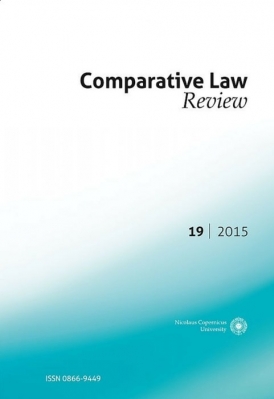Judicial Interpretation of Legislation as a Source of Rules of Legislative Procedure and Legislative Drafting: a Comparative Study of United Kingdom and Nigerian Court Cases on Legislative Drafting
Judicial Interpretation of Legislation as a Source of Rules of Legislative Procedure and Legislative Drafting: a Comparative Study of United Kingdom and Nigerian Court Cases on Legislative Drafting
Author(s): Tonye Clinton JajaSubject(s): Law, Constitution, Jurisprudence
Published by: Wydawnictwo Naukowe Uniwersytetu Mikołaja Kopernika
Keywords: statutory interpretation; legislative drafting; legislative procedures; common law
Summary/Abstract: The quotations above encapsulate the essence of this research study. The underlying purpose of this research study is born out of the understanding that: “drafting style and practices are always capable of improvement”1.However, the traditional view is that legislators and legislative drafters are the major authors of legislative drafting conventions.This research study applies a novel approach to the study of legislative drafting considering that it examines “[s]ome (…) [legislative drafting] conventions [that] have statutory or case-law origins” such as the judgments in the cases of Bulmer v. Bollinger [1974] EWCA Civ. 14 and Pepper (Inspector of Taxes) v. Hart2.This novel approach is based on “Tetley’s three themes of comparative analysis in legislative drafting namely: rules of (statutory) interpretation, stare decisis and [legislative] drafting conventions and techniques”3. These themes of analysis are relevant when undertaking a study of comparative legislative drafting4 such as in this present study which is a comparative study of case studies in the United Kingdom and Nigeria. Unlike others, the legislative drafting conventions that originate from case law have the advantage of carrying the authority of law based on the common law doctrines of precedent and stare decisis.Besides case law, this research examines some modern theories, and innovations in the field of legislative drafting that common law judges may not be familiar with. It is hoped that “[t]his guide examines some legislative drafting conventions, the knowledge of which may help judges with statutory interpretation”5.This study also examines the common law rules of judicial precedent, stare decisis, and statutory interpretation that apply in Nigeria and the United Kingdom.The purpose is that such an examination will prove instructive to legislators and legislative drafters themselves when they prepare legislation. For example, by providing an analysis of the judgement in Bulmer v. Bollinger [1974] EWCA Civ. 14, this study makes a case for the inclusion of Purpose Clauses in common law legislation and the application of a purposive style of statutory interpretation.Collectively, the case law examined demonstrates that both United Kingdom and Nigerian Courts are “capable of endogenous (homegrown) development (…) to meet new technical problems or social needs”. The role of the Courts in this regard is “inevitable because it would be humanly impossible for the drafter or the legislator to draft legislation that would cover every situation”.
Journal: Comparative Law Review
- Issue Year: 19/2015
- Issue No: 1
- Page Range: 149-201
- Page Count: 53
- Language: English

